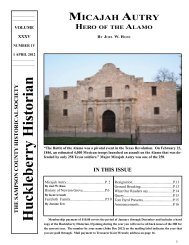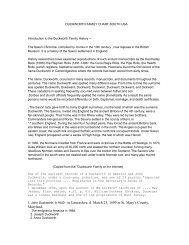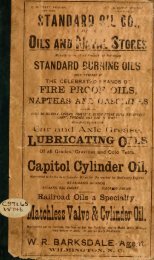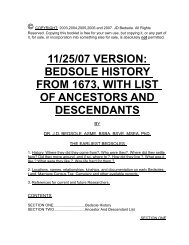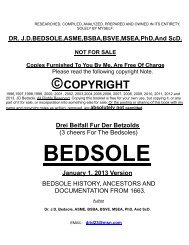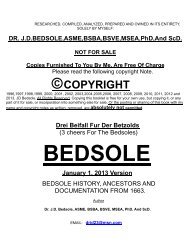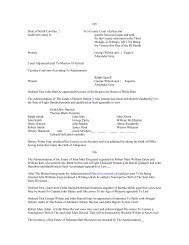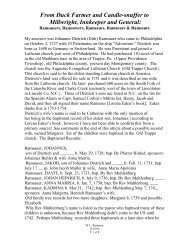Bedsole - NCGenWeb
Bedsole - NCGenWeb
Bedsole - NCGenWeb
Create successful ePaper yourself
Turn your PDF publications into a flip-book with our unique Google optimized e-Paper software.
meant one less person to work in the fields to produce food. Whatever corn could be salvaged for food, had<br />
to be taken to a mill or hand-ground with rocks into meal for cornbread from time to time. Since one-third of<br />
the meal had to be given to the miller in payment for the grinding, too little was left for the family to last out a<br />
long winter season.<br />
Because of all the bugs and rats, when the women started to cook bread, they had to spend an hour before<br />
that picking the weevils, worms, bugs and especially rat excrement out of the meal. Nobody worried much<br />
about things like rat and mice droppings though, which were too small and numerous to pick out of the meal.<br />
It was just considered "Flavoring" for lack of a better word.<br />
There was no way to keep green vegetables through the winter months, but potato's were stored by digging<br />
a hole in the ground about 4 feet across and 3 feet deep, lining it with dry pine straw, filling the hole with<br />
potato's, then covering them with more pine straw. The turpentine in the straw would keep out the rats, bugs<br />
and worms. Hand made wooden shingles were made and stuck in the ground around these holes at an angle<br />
leaning towards the center so they formed a kind of teepee. The shingles were then covered with about a<br />
foot of dirt. But the problem was, if just one potato started to rot, as they usually did for any reason at all, the<br />
entire lot was lost within 3 to 5 days. In general, the most the farmers could hope for was half of what was<br />
stored to last long enough to be eaten. That meant they had to produce and store twice as much as they<br />
needed in order to have enough for the winter months after spoilage and pests were taken into consideration.<br />
But that meant more cleared land, more planting and constant cultivation until harvest time.<br />
The various but increasing needs of these families constantly demanded more and more time and labor.<br />
Dried Peas and beans could be kept in bags but many times those were not available. When they were, the<br />
rats soon ate holes in the bags and pests of every kind got to them and into them too. In the summer,<br />
everybody had so much work to do they had little time to prepare, plant and take care of a garden. Work in<br />
the fields was a twelve months a year, seven days a week, fourteen hours a day job. Hunting was limited to<br />
meat for food, or animal hides, for clothes and bed covers. It was generally not done for fun or pleasure.<br />
Many people could not afford a gun and with so many kids around all the time, they were afraid to have one.<br />
However, due to the danger from Indians and wild animals, almost everyone eventually acquired a gun from<br />
necessity to acquire food. But with the smaller wild animals such as rabbits, possums and raccoons and the<br />
inaccuracy of the guns at longer distances, sometimes the only choice for getting these small animals was<br />
traps and animals were usually too smart to fall for traps. So meat was a real rarity and a huge treat when<br />
acquired. Invariably though, all the neighbors came over to share when it was acquired by any family, if they<br />
did'nt live too far away. In due time, a log store was built near the Beaverdam settlement and trade became a<br />
way of life.<br />
The settlers and Indians traded with and among the store and themselves and of course, the people all<br />
traded with the store owner. They traded cloth, sugar, salt, grease, eggs, skins, leather, vegetables, fruit,<br />
lead, gunpowder, clothing, smoked meat, corn, lumber, shoes, farming tools and etc. and in a constant<br />
stream, more and more such goods made their way from the supply ships and ports from England to ports in<br />
Louisiana, Virginia, North Carolina, New York, Philadelphia and other ports in the “New Land” and then to the<br />
frontier settlements via wagon trains. Marauding Indians quickly learned to rob and steal these supplies and<br />
many times, to kill the accompanying people.<br />
PAGE TWENTY TWO<br />
The addition of guards to these wagons followed, but this necessitated higher prices being paid by the<br />
settlers and farmers for the goods being transported, due to the cost of the guards to the transporter.



